After a lean October, November was a bumper month for reviews in the History, Memoir and Biography category, with 19 reviews received of 16 books.
It’s always pleasing to see a book receiving reviews eight years after publication, as is the case this month with Anita Heiss’ Am I Black Enough for You? Since its publication in 2012, it has been reviewed by fourteen Australian Women Writers Challenge readers, and now Cathy Powell joins them with her review. The other books that have been ’rounded up’ in the past are more recent publications including Julia Baird’s Phosphorescence (Denise Newton’s review here); Miranda Tapsell’s Top End Girl (another of Denise’s reviews here) and Kerry Highley’s Dancing in My Dreams: Confronting the Spectre of Polio (reviewed by Jennifer Cameron-Smith here).
Our new reviews for November seem to fall into four categories.
Writers on Writers
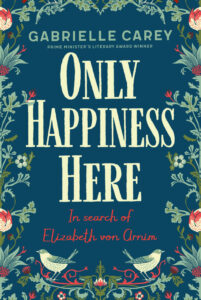 Gabrielle Carey’s Only Happiness Here (2020) is a biography of the Australian-born writer Elizabeth von Armin. She was born in Sydney in 1866, but her time and connection with Australia was short. Her parents took her back to Europe in 1870, then the family lived in London. Her first book Elizabeth and Her German Garden was published in 1898 under the pen-name ‘Elizabeth’ and the 20 books that followed were published with the tag ‘by the author of Elizabeth and Her German Garden‘. In her review, Brona writes that:
Gabrielle Carey’s Only Happiness Here (2020) is a biography of the Australian-born writer Elizabeth von Armin. She was born in Sydney in 1866, but her time and connection with Australia was short. Her parents took her back to Europe in 1870, then the family lived in London. Her first book Elizabeth and Her German Garden was published in 1898 under the pen-name ‘Elizabeth’ and the 20 books that followed were published with the tag ‘by the author of Elizabeth and Her German Garden‘. In her review, Brona writes that:
This is very firmly in the camp of biblio-memoir or bio-memoir. Carey is very much a part of the story, as she rereads the books and interprets what she finds there. It is also her personal search for happiness and peace of mind, as she delves into von Armin’s life, looking for clues or signs on how to be happy. ……She eventually hits upon nine Principles of Happiness According to Elizabeth von Armin – freedom, privacy, detachment, nature & gardens, physical exercise, a kindred spirit, sunlight, leisure and finally, creativity. Carey developed each principle into a chapter or section that interspersed von Armin’s writing with known facts about her life. (See review here).
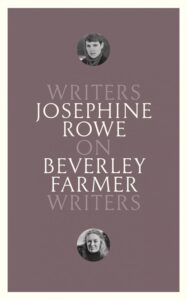 Brona also reviewed Josephine Rowe’s contribution to the Writers on Writers series On Beverley Farmer (2020) which she describes as a “non-fiction novella”. Brona writes:
Brona also reviewed Josephine Rowe’s contribution to the Writers on Writers series On Beverley Farmer (2020) which she describes as a “non-fiction novella”. Brona writes:
I confess that I did not know very much about Farmer prior to reading this book, and I’m not sure I know a whole lot more now. But I suspect, she was that kind of person. Very private. Extremely shy. But I am curious to know more. …It certainly seemed that part of Rowe’s fascination for Farmer, was for what Farmer’s life and work could tell her about herself as well. Most of the essay consists of Rowe discussing the nature of writing (her own and Farmer’s) and what it means to be a reader (especially of Farmer’s work). (See review here).
During November we had four reviews for Searching for Charlotte (2020), Kate Forsyth and Belinda Murrell’s jointly-written biography of Charlotte Waring Atkinson, the author of Australia’s first book for children. She is also their sisters’ great-great-great-great grandmother. In her review, Shellyrae@Book’dOut writes:
Searching for Charlotte is a hybrid narrative, a historical biography but one that is inextricably blended with the folklore of the sisters family history, and their own journey of discovery. Only so many questions can be answered definitively with what remains of the past…records, letters, diary entries, all of which Kate and Belinda draw on, but to fill in the gaps the sisters take some liberties, some of which comes from the stories passed down through generations, some from the informed speculation of the two women. …A narrative that reveals adventure, tragedy and triumph, country and culture, folklore and family, I found Searching For Charlotte to be an engaging and enlightening read. (Review here)
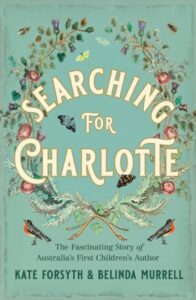 Ashleigh Meikle from The Book Muse describes it as:
Ashleigh Meikle from The Book Muse describes it as:
.. a wonderful book, where fiction techniques were combined with non-fiction to create a powerful and touching story of feminism, family and the will to survive – and the impact of family history on the future – and the way the present mirrors the past sometimes. (Review here)
Janine at Resident Judge of Port Phillip is more equivocal:
This jointly-written book is not a straight biography: instead, like a Who Do You Think You Are? episode, this is just as much about the searchers and the search as it is about the quarry. …I think that a reader’s response to this book will depend heavily on how strictly they interpret the ‘rules’ of biography. For myself, I found the present-day family history rather unnecessary, the imaginative writing superfluous and the speculation unstable. However, for other readers I’m sure that the humanizing and integration of the past and present would have a strong appeal. (Review here)
This was the case for Jennifer Cameron-Smith, who writes that:
As I read this book, I was delighted by the way in which Belinda and Kate were able to work together and were able to travel with their own daughters, to learn more about their family history. …This is not a straight biography, nor is it purely fictional. It is a blend of fact, of imagination, of impressions gained by research and travel. …I enjoyed the book and I imagine I would have enjoyed it even more if I was a family member. (Review here).
Well-Being
A number of books reviewed this month are an integration of memoir with a reflection on identity, health and well-being.
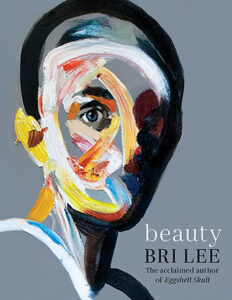 Reviewer Georgia Rose has read several books with this theme during November. Bri Lee’s Beauty (2019) is a meditation on beauty and body image from the author of Eggshell Skull, which several of our readers have reviewed over the past two years. Georgia writes:
Reviewer Georgia Rose has read several books with this theme during November. Bri Lee’s Beauty (2019) is a meditation on beauty and body image from the author of Eggshell Skull, which several of our readers have reviewed over the past two years. Georgia writes:
This is a deeply personal essay, where Lee delves into her own experiences with disordered eating and body image, then zooms out to look at a society which constantly bombards her with impossibly thin models, outrageously expensive beauty products and the message that she is not worthwhile unless she is beautiful. (Review here)
Georgia also read radio broadcaster Jacinta Parson’s Unseen (2020) where she explores the challenges of living with an invisible chronic medical condition. Georgia writes that:
Parsons does a great job of zooming in on her own story, then zooming out and looking at the public health system in Australia and the things we could do make things just a bit better for people living with chronic illness. (Review here)
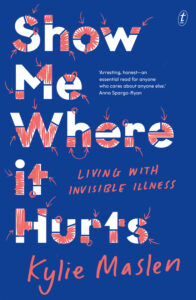 Another book about invisible illness that Georgia read during October was Kylie Maslen’s Show Me Where It Hurts: Living with Invisible illness (2020). It was Shortlisted in the Non-Fiction section of the Victorian Premier’s Literary Awards, 2021. Georgia’s brief review (available here) describes it as “a thoughtful, person and powerful collection of essays about life with chronic pain and chronic illness.”
Another book about invisible illness that Georgia read during October was Kylie Maslen’s Show Me Where It Hurts: Living with Invisible illness (2020). It was Shortlisted in the Non-Fiction section of the Victorian Premier’s Literary Awards, 2021. Georgia’s brief review (available here) describes it as “a thoughtful, person and powerful collection of essays about life with chronic pain and chronic illness.”
Finally, Shelleyrae@Book’d out read comedian Fiona O’Loughlin’s Truths from an Unreliable Witness (2020). This is O’Loughlin’s second memoir, and it is a much darker and more work than her earlier Me of the Never Never (which Shelleyrae also reviewed here). O’Loughlin’s alcoholism was mentioned in the first memoir, but through this second book we learn that it was largely responsible for her 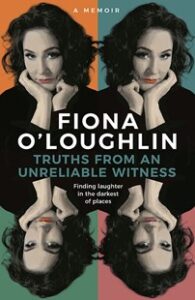 disappearance from the public eye. Shelleyrae describes it as:
disappearance from the public eye. Shelleyrae describes it as:
a raw, candid account of Fiona’s battle with alcoholism, her repeated failures to curb her addiction over the last decade or so which lead to the end of her marriage, and very nearly her career, multiple stints in rehab facilities, penury, a flirtation with meth, pills, a suicide attempt, and a coma. Fiona makes it clear that her perspective of these events is skewed by her addiction, that her memory is not always reliable, that some details are lost forever to black-outs, but this is the truth she has, and is willing to share. (Review here)
Life Writing
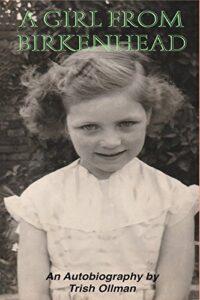 Jennifer Cameron-Smith read two self-published memoirs by Trish Ollman, A Girl from Birkenhead, published in 2016, and her second memoir Cry: The Tears of a Girl from Birkenhead. Although distracted by the grammatical and word choice issues, she found the first memoir “sometimes heartbreakingly sad and sometimes wryly amusing” (review here) and immediately picked up the second memoir. Jennifer writes:
Jennifer Cameron-Smith read two self-published memoirs by Trish Ollman, A Girl from Birkenhead, published in 2016, and her second memoir Cry: The Tears of a Girl from Birkenhead. Although distracted by the grammatical and word choice issues, she found the first memoir “sometimes heartbreakingly sad and sometimes wryly amusing” (review here) and immediately picked up the second memoir. Jennifer writes:
In her opening to this book, Ms Ollman explains that she left a lot out of her first autobiography ‘A Girl from Birkenhead’ and this book is a ‘no holds barred’ account of her life. She also notes that those of us who have read the first book will already know some parts of her life story. So, this book is perhaps more of a revision than a sequel. (Review here)
Politics
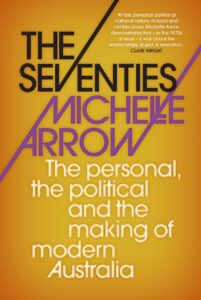 Michelle Arrow’s book The Seventies: The personal, the political and the making of modern Australia (2019) received the Ernest Scott Prize in 2020, awarded annually to the book judged to be the most distinguished contribution to the history of Australia or New Zealand or to the history of colonisation published in the previous year. Janine at Resident Judge writes:
Michelle Arrow’s book The Seventies: The personal, the political and the making of modern Australia (2019) received the Ernest Scott Prize in 2020, awarded annually to the book judged to be the most distinguished contribution to the history of Australia or New Zealand or to the history of colonisation published in the previous year. Janine at Resident Judge writes:
Her book does not pretend to be a comprehensive history of the decade, but it does emphasize social change rather than political events and economic policies …[Making] the women’s movement and the gay and lesbian movement her main frames of analysis, this book traces these two themes through the 1970s, discussing social and political events of those years along the way… It is carefully footnoted and researched, but it maintains a light tone which is personal at times. It is well-structured in a narrative sense with chapters divided into discrete sections, and ‘hooks’ at the start and end of each section to drive the argument forward. (Review here)
Jump forward fifty years to Margaret Simon’s biography of Senator Penny Wong (2019). Nancyelin reviewed the 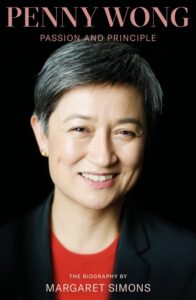 book:
book:
My first impression was in the book’s preface: Ms Wong was reluctant to cooperate with Ms Simons. She told Ms Simons she was an introvert…and suffered from prejudice and therefore developed a closely guarded internal life, yet Margaret Simons persevered to give the reader a book that is lucidly written, logically-structured and convincingly argued.
Nancyelin found it “a very difficult book to read because of my lack of knowledge about the nuts and bolts of Australian politics”. Nonetheless, she felt that “Ms Simons did an honorable job with the little input she had from Penny Wong”. (Review here)
About: I’m Janine Rizzetti and I blog at the immodestly-named The Resident Judge of Port Phillip where I indulge my love of reading, podcasts and history. I am a historian, interested in Australian and colonial history, officially retired but more occupied than I thought I would be with my local historical society, playing with grandchildren, learning Spanish and now brandishing a ukulele!

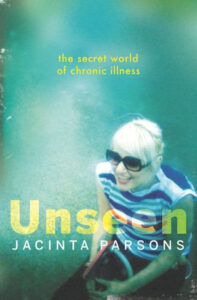




What a terrific wrap up and great to see a bumper month of reviews submitted in the History, Memoir and Biography category last month.